ROBERT WILLIAMS BUCHANAN (1841 - 1901)
|
ROBERT WILLIAMS BUCHANAN (1841 - 1901) |
|
|
|
|
|
|
|
|
ROBERT BUCHANAN AND THE GLASGOW SENTINEL - continued (iv)
Adverts for Mary, and Other Poems The Glasgow Sentinel (26 February, 1859 - p.8) |
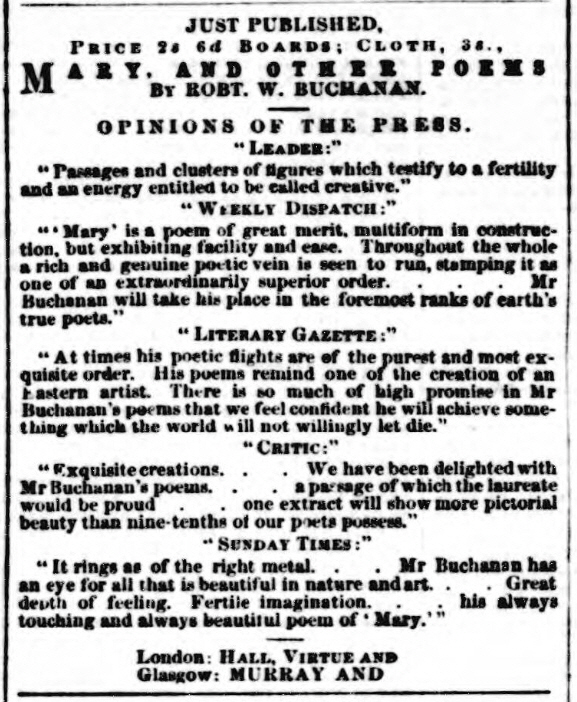 |
||||||||
|
The Glasgow Sentinel (26 March, 1859 - p.8) |
||||||||
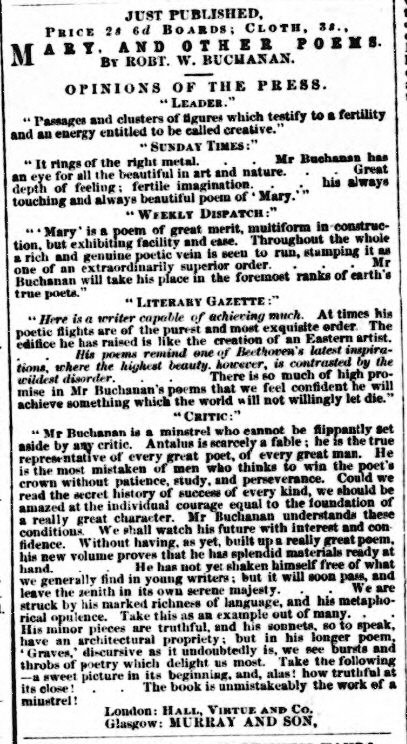 |
||||||||
|
The Glasgow Sentinel (23 April, 1859 - p.2) Original Poetry. IN THE MAY WOODS. BY ROBERT W. BUCHANAN.
THE roach he leapt from fall to fall, And sweetly, list’ning to the thrush, I sat, exchanging with my soul I dreamt the dreamiest dream e’er found This dream of mine came to me when Love never fairer train espied, My vision took strange phase, good lack! And Stentor Johnson loudly led Old Chaos with Pomona roved, Ben Khorat led a quiet train, Voltaire with Taylor, casting creed, That dreamiest of dreams—alas! So, from that other world, and thro’ “These laurelled joys in common coats, “All thoughts their nobleness has made Passed bard and sage, passed blamed and famed, But while I talked with Poesy, The music grew, the music flew, When every soul in that sweet throng
[Note: The echo here of Sir John Suckling’s ‘A Session of the Poets’ is interesting since Buchanan would later write his own ‘Session of the Poets’ which would add to his troubles with Swinburne and the Pre-Raphaelites.] ___
The Glasgow Sentinel (20 August, 1859 - p.4) Original Poetry. ERATO. Holding her silver chalice to my lips ROBT. W. BUCHANAN. ___
This was the final, signed contribution of Robert Buchanan Jr. to The Glasgow Sentinel which I could find. I should add that the scans of the pages on the British Library Newspaper Archive site, were not perfect, so there was no point relying on a search for ‘Buchanan’, and I had to check each page. Obviously, since this was a rather tedious business, I might have missed something. I checked the copies of The Glasgow Sentinel up to 30th June, 1860, by which time Buchanan would have moved to London. As mentioned in the introduction to this section, I believe there were two possible reasons for the reduction in Buchanan’s contributions to The Glasgow Sentinel in 1859. One is the fact that Buchanan’s father did own two other newspapers in Glasgow, The Glasgow Times and The Penny Post, both of which, unlike The Glasgow Sentinel, published fiction. The Glasgow Sentinel (30 July, 1859 - p.8) |
||||||||
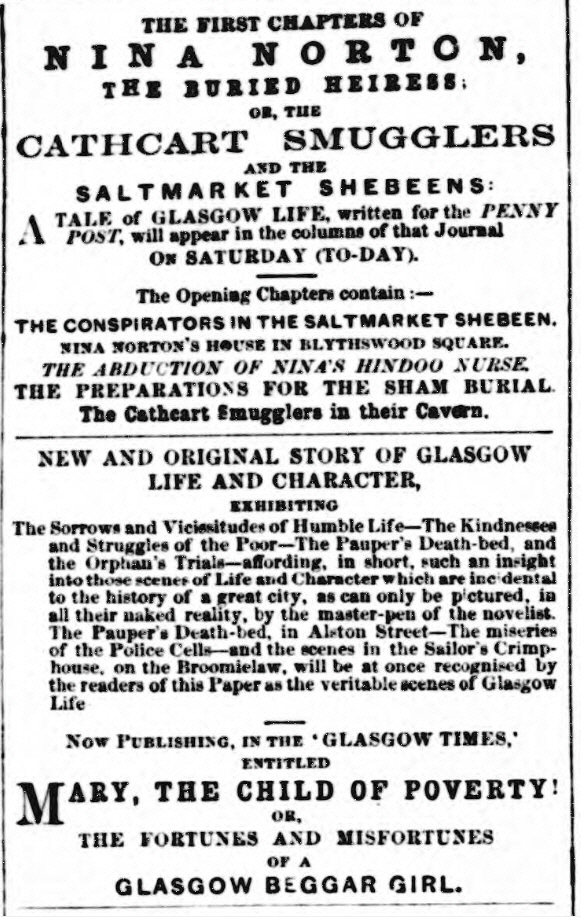 |
||||||||
|
The Glasgow Sentinel (29 October, 1859 - p.5) |
||||||||
 |
|
Of course, I’m not suggesting that Buchanan was employed churning our anonymous fiction for his father’s other papers, I’m just suggesting that they might have supplied him with another outlet for his early work. According to the advert below from The Glasgow Herald of 6th July, 1855, Buchanan Snr. would seem to have acquired The Glasgow Times in that year. As for The Penny Post, in his bankruptcy hearings of 1860, referring to his earlier problems in November 1856, he stated: “I was then proprietor of the Sentinel and Penny Post newspapers, which latter had been started shortly before then.” |
 |
|
I also came across this interesting piece in The Glasgow Sentinel of 5th February, 1859 which gives a bit more background to Buchanan Snr.’s other newspapers. The other reason for the apparent reduction of Buchanan Jr.’s contributions to The Glasgow Sentinel is his involvement with The West of Scotland Magazine and Review. As to when this involvement began, I’m not sure. The previous editor, John Macpherson, had been murdered on 31st July, 1859. [The Glasgow Herald reported the murder on 1st August, and published an obituary of Macpherson on 3rd August.] There is very little information about the magazine online, so I’m not sure what happened next, but, the following adverts from The Glasgow Sentinel show the involvement of Robert Buchanan Jr. as a contributor to The West of Scotland Magazine and Review, and an undated letter to Le Chevalier de Chatelain seems to confirm that Buchanan was its editor.
The Glasgow Sentinel (1 October, 1859 - p.8) |
|||
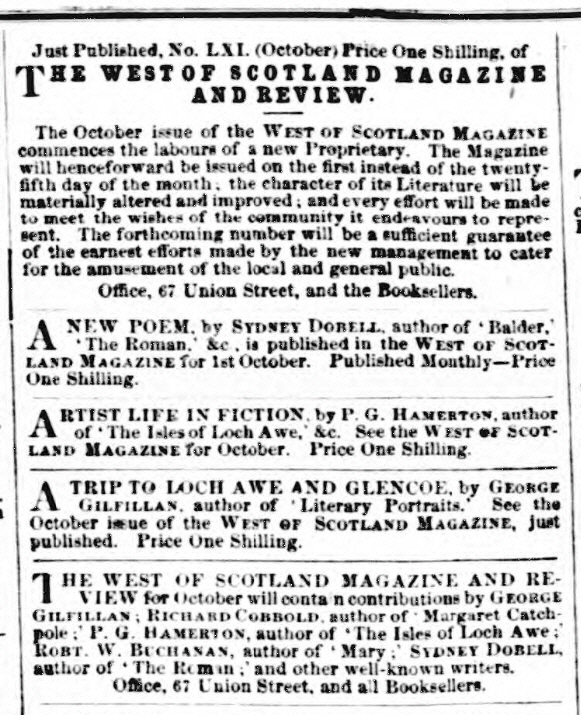 |
|||
|
The Glasgow Sentinel (19 November, 1859 - p.5) |
|||
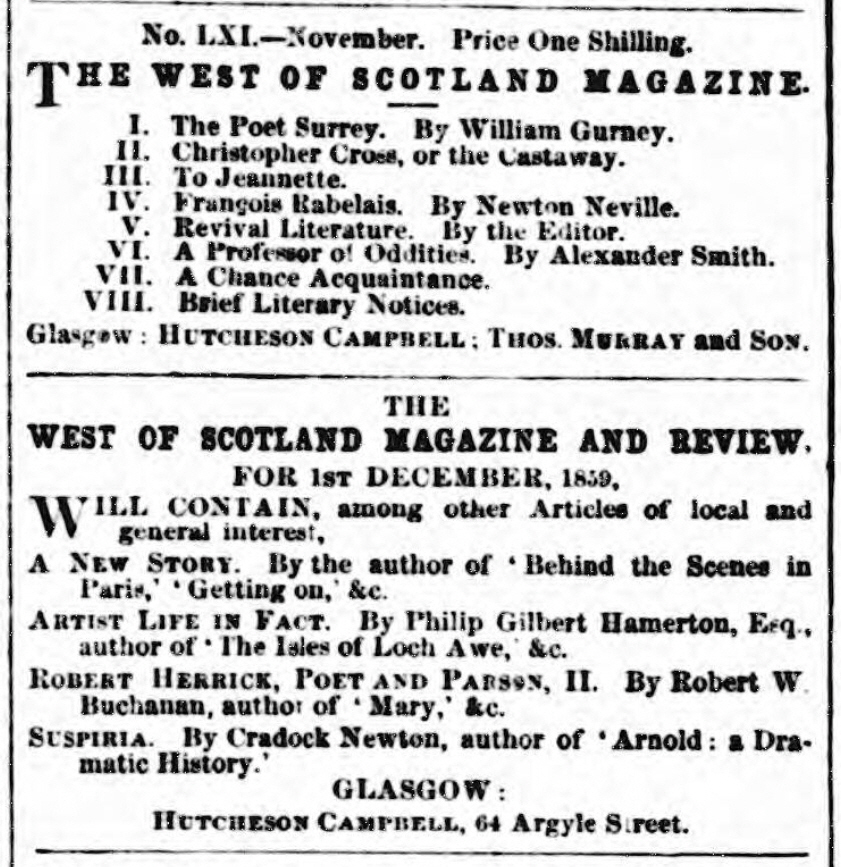 |
|
The Glasgow Sentinel (3 December 1859 - p.5) |
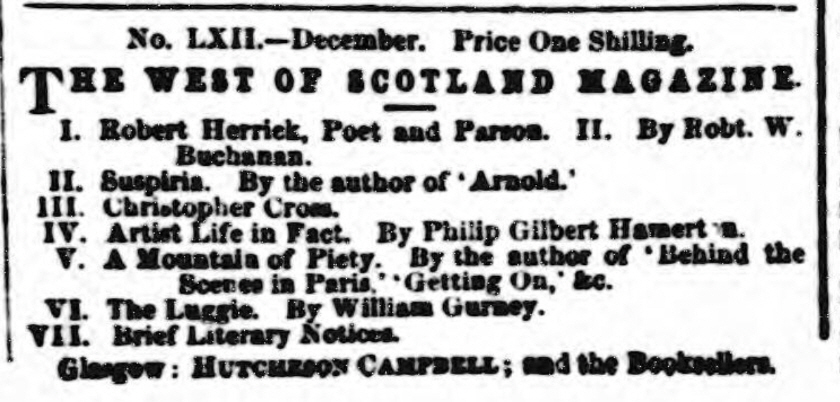 |
|
The reappearance of the Herrick essay in the December issue of The West of Scotland Magazine and Review would indicate that Buchanan Jr. was now the editor (and the letter to Le Chevalier de Chatelain mentions a contribution which he wants to receive by January - presumably 1860). One item in the advert for the November issue, “Revival Literature. By the Editor”, would confirm that Buchanan was responsible for the relaunch of the magazine, if it turned out to be this unsigned article with the same title, published in The Glasgow Sentinel of 15th October, 1859. As far as I could tell, there were no more adverts for The West of Scotland Magazine and Review in The Glasgow Sentinel after the December issue, although the magazine did continue to be published. In Ronces et Chardons by Le Chevalier de Chatelain (privately published in 1869), a list of his works includes the following: “1860. VICTOR HUGO. A Biography written for ‘The West of Scotland Magazine and Review,’ then edited by the poet, Robert Buchanan.” And a review of The West of Scotland Magazine and Review published in Reynolds’s Newspaper, 11th March, 1860, refers to the piece about Hugo. I apologise for the vagueness of all this - obviously, more research is needed. _____
5. A few more Items of Interest Since my main concern was finding items relating to Robert Buchanan Jr., and I was pressed for time, I did not turn up many of these in the issues prior to and after 1858, but these did catch my eye: The Glasgow Sentinel (27 August, 1859 - p.2) |
||||||||||||||||||||
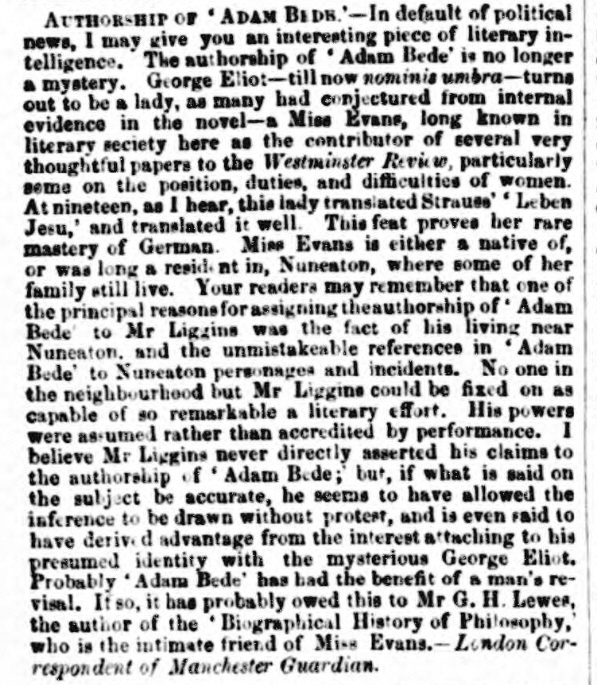 |
||||||||||||||||||||
|
The Glasgow Sentinel (31 March, 1860 - p.1) |
||||||||||||||||||||
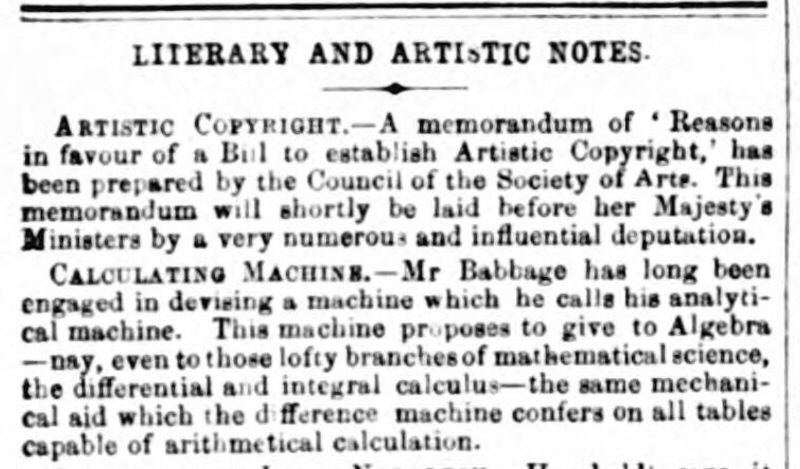 |
||||||||||||||||||||
|
And this final mention of Robert Buchanan Jr. The Glasgow Sentinel (6 August, 1864 - p.5) |
||||||||||||||||||||
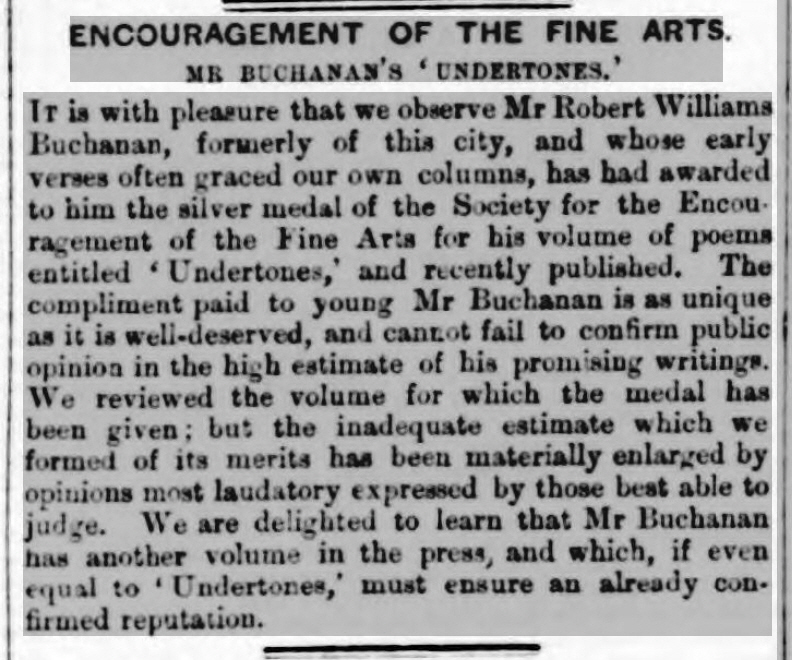 |
||||||||||||||||||||
|
6. Robert Buchanan Snr. and the early years of The Glasgow Sentinel
The Glasgow Herald (14 April, 1851 - p.8) |
||||||||||||||||||||
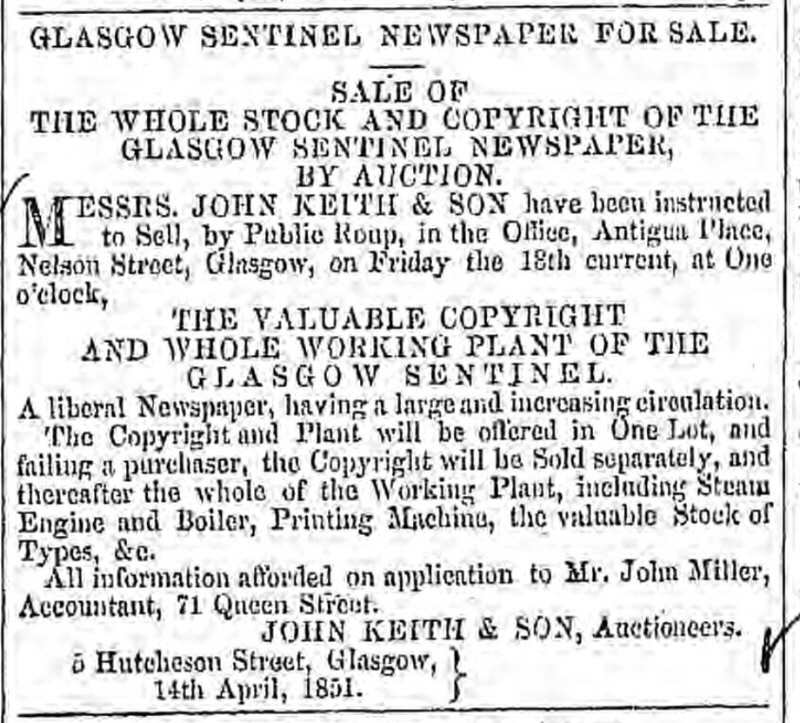 |
||||||||||||||||||||
|
The Glasgow Herald (18 April, 1851 - p.8) |
||||||||||||||||||||
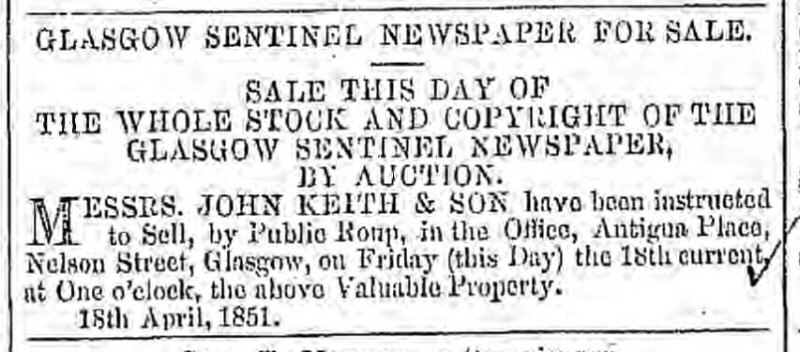 |
||||||||||||||||||||
|
Robert Buchanan Snr. presumably bought The Glasgow Sentinel at this auction on 18th April, 1851. Information concerning how he financed the acquisition was revealed in his bankruptcy hearings in 1860: “I commenced business in Glasgow in 1851 as proprietor of the Glasgow Sentinel newspaper. I was then possessed of no capital; but I raised £600 upon a life insurance policy with the assistance of some friends in London. With £500 of this sum, and my own acceptances for £330, I purchased the copyright, plant, and book debts of the Sentinel from the then proprietors.” The Glasgow Sentinel was a weekly newspaper of 16 pages. There was a final issue of this length on 19th April, 1851, then it appeared as a 4 page paper until 31st May when the following announcement appeared: |
||||||||||||||||||||
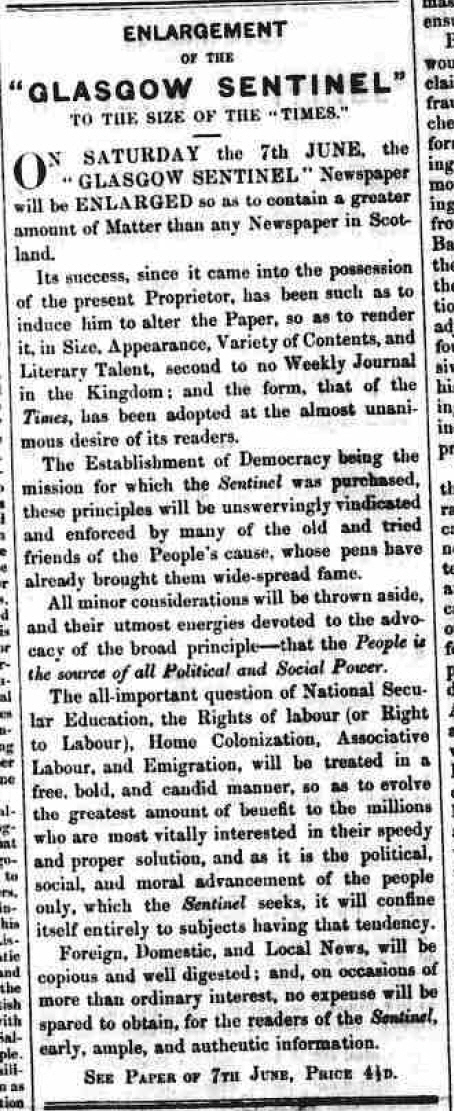 |
||||||||||||||||||||
|
From the issue of 7th June, 1851 on, The Glasgow Sentinel was an 8 page paper and the editorial page carried this quotation from Tom Paine’s The Rights of Man beneath the title: |
||||||||||||||||||||
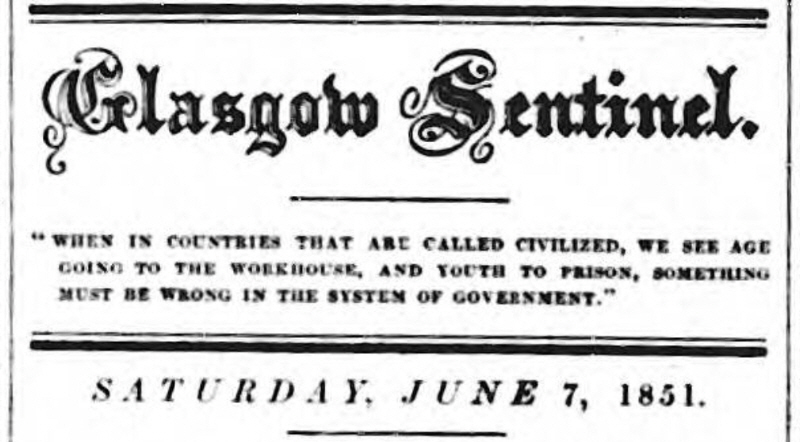 |
||||||||||||||||||||
|
As well as being a newspaper proprietor, Robert Buchanan Snr. was also involved in the local politics of Glasgow, and stood (unsuccessfully) as a candidate in the municipal elections of 1852 and 1854. The Glasgow Sentinel (24 July, 1852 - p.5) |
||||||||||||||||||||
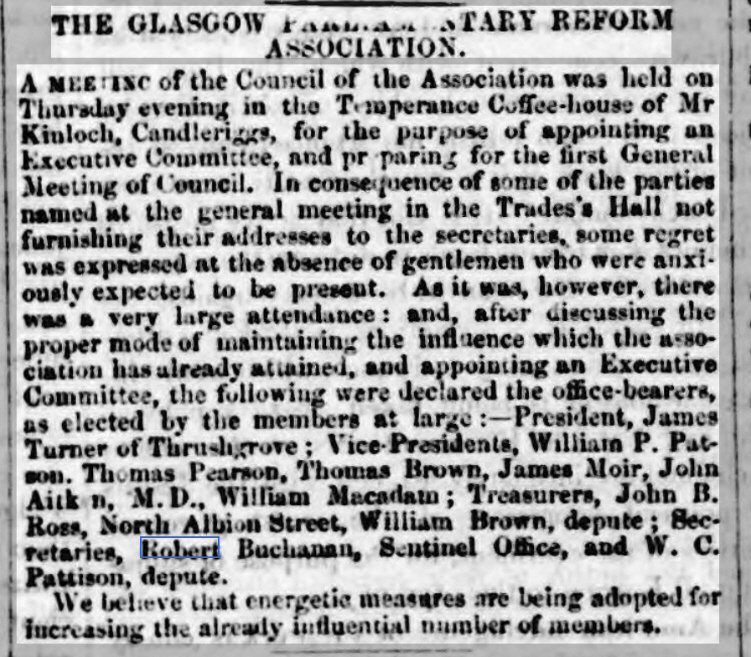 |
||||||||||||||||||||
|
The Glasgow Sentinel (23 October, 1852 - p.1) |
||||||||||||||||||||
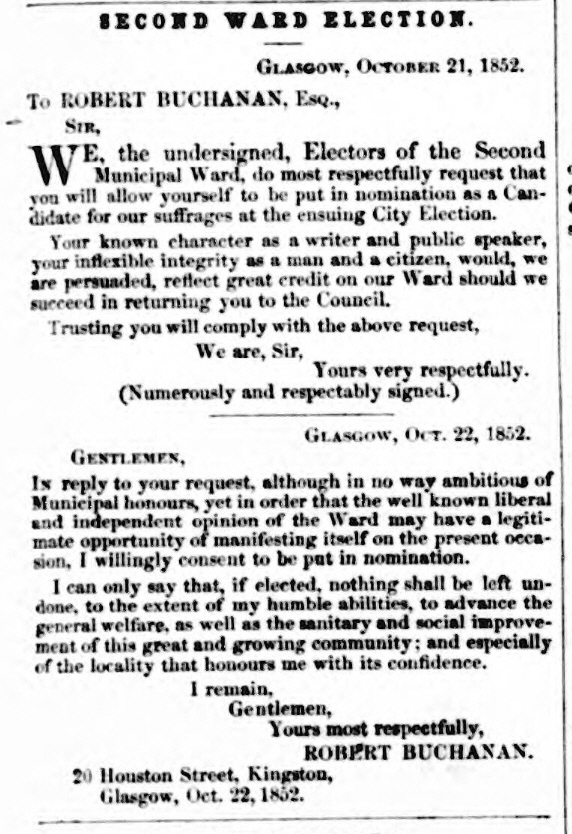 |
||||||||||||||||||||
|
The Glasgow Sentinel (6 November, 1852 - p.5) |
||||||||||||||||||||
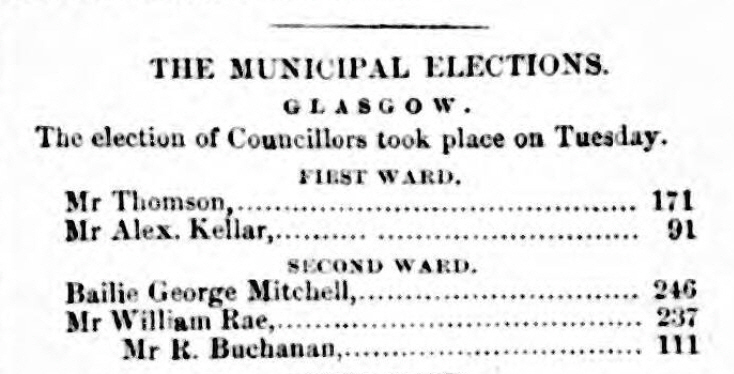 |
||||||||||||||||||||
|
Despite his lack of success in politics, Robert Buchanan Snr. was honoured at a Complimentary Supper in January, 1853. The Glasgow Free Press (29 January, 1853 - p.2) COMPLIMENTARY SUPPER. On Thursday night, the friends of Mr Robert Buchanan, Editor of the Glasgow Sentinel, entertained that distinguished citizen by a supper in the Tontine Hotel, when upwards of three hundred persons partook of a plentiful repast, in a commodious and handsome apartment—Mr Joseph Millar taking the chair, and Mr John Cairns acting as croupier. The usual toasts having been honoured at the conclusion of the supper, the guest of the evening (after his health was enthusiastically drunk) was presented with a token of the love and esteem of his admirers, in the shape of thirty sovereigns. Mr Buchanan made a very eloquent reply, in which he ably alluded to his candidature for the representation of the second municipal ward, and for which we regret we have no space for more than an outline.—With regard to the Municipal Election, said Mr. B., I was no volunteer. (Cheers.) It was found that there was no candidate in the field to represent the feelings and opinions of the really liberal electors of the district, and such being the case, I was requested to stand as a candidate. (Cheers.) In complying with the request, I was seeking to represent what has been one of the most liberal wards of the 16, and I did so, in behalf of immutably liberal principles, and because I considered neither of the other gentlemen in the field came up to the mark. (Cheers.) When I contested that ward I had no expectation of carrying it, but I felt that the Reformers of that ward ought to be properly represented, and that if they so willed it, they should not be without an independent voice in our civic Parliament. In that contest I was assailed in a manner calculated to excite religious bigotry, and influence, in an improper manner, [by] a portion of the electors. Still I was not daunted by their opposition, and I stood the contest to the last. (Cheers.) In that effort I was not successful—still I polled 111 votes, certainly a large number for the ward, seeing that when I entered the field I scarcely knew a voter, and had but a few days before the poll to make myself acquainted. I was, however, not disappointed. Though had I been elected, I flatter myself I might have been of some service, from my public experience, as I think members of the Town Council ought to understand their functions and their duties somewhat better than many of them elected as the representatives of cliques and coteries. A number of other toasts being given and responded to, the company, after an evening passed in the utmost happiness and harmony, separated at a late hour.
[Note: In the editorial on the same page as the above report, there was another mention of Buchanan’s complimentary supper.] ___
The Glasgow Sentinel (28 October, 1854 - p.5) |
||||||||||||||||||||
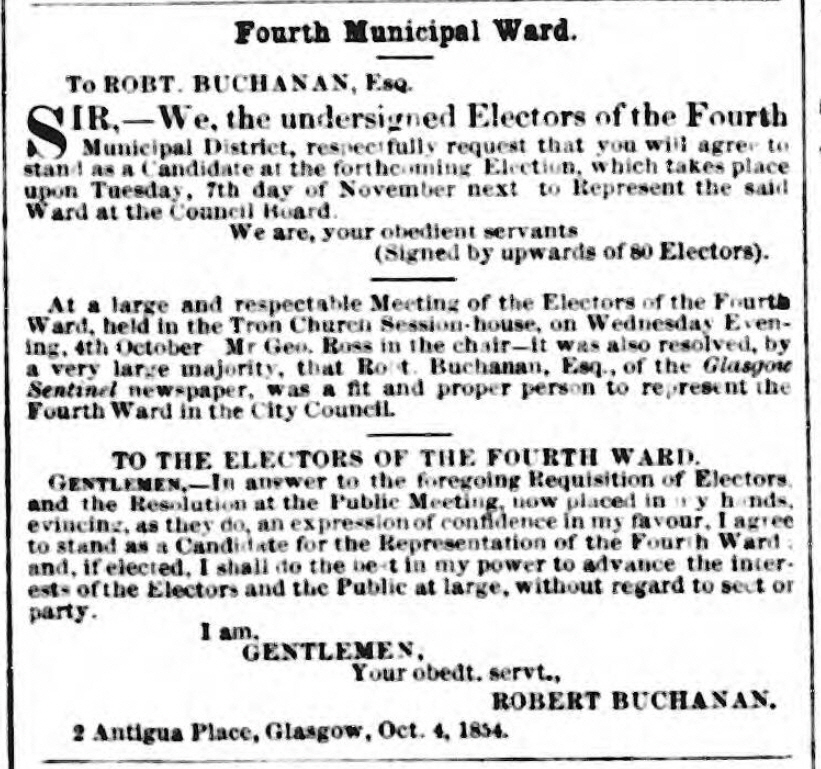 |
|
The Glasgow Sentinel (11 November, 1854 - p.3) |
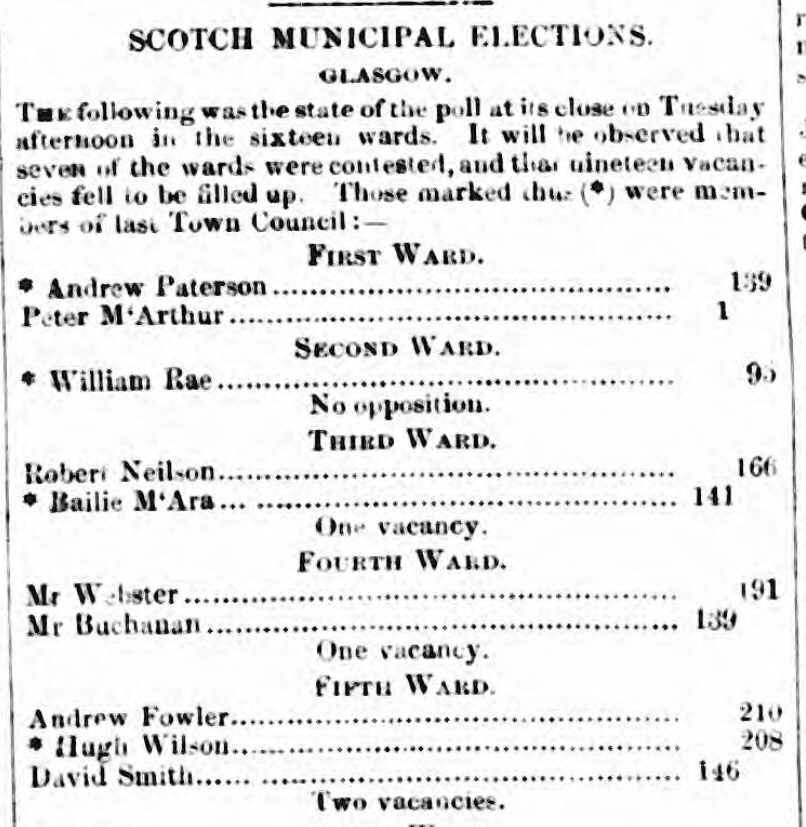 |
|
More information about Robert Buchanan Snr. is available on the following pages: The Bankruptcy of Robert Buchanan Snr. _____
Back to Robert Buchanan and The Glasgow Sentinel - main menu or back to Poems from Other Sources
|
|
|
|
|
|
|